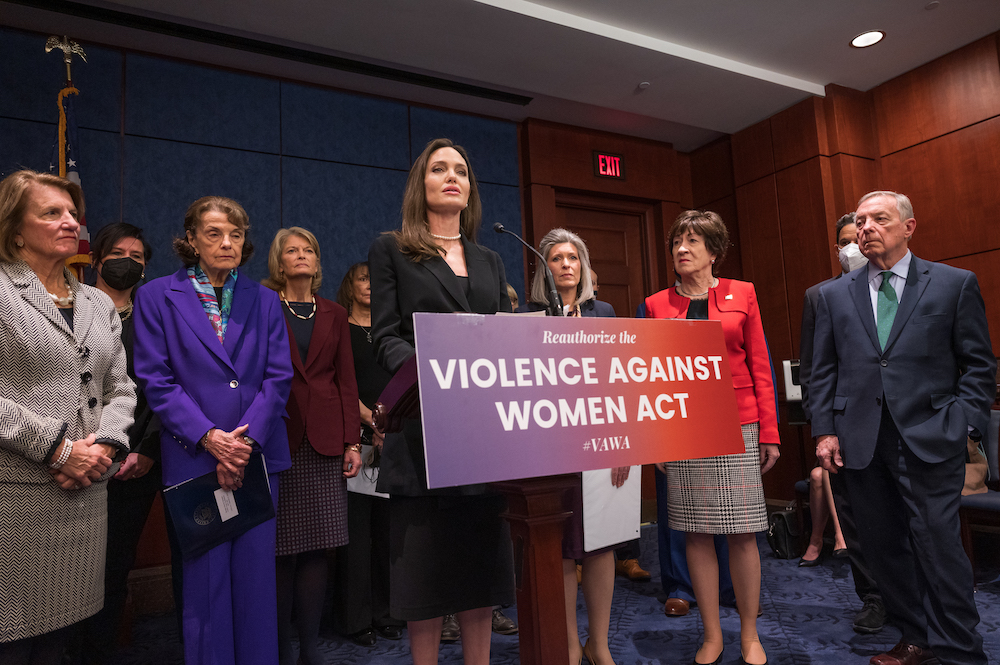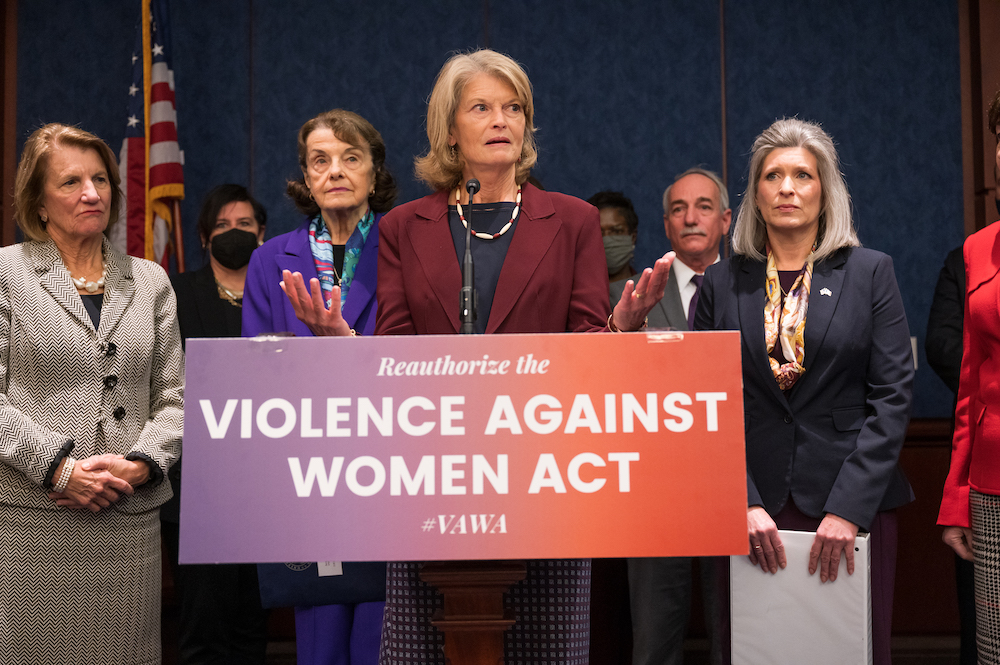
- Details
- By Jenna Kunze
The House on Wednesday voted to reauthorize the Violence Against Women Act as part of its proposed $1.5 trillion spending package that includes $73.4 million for urban Indian health and $6.6 billion for Indian Health Services.
First enacted in 1994, the Violence Against Women Act, written by then-Senator Joe Biden, was intended to help prevent and improve response to domestic violence, dating violence, sexual assault and stalking. The bill has been reauthorized several times over the past three decades, but lapsed four years ago and hasn’t been officially renewed since.
Want more Native News? Get the free daily newsletter today.
Last month, U.S. Senator Lisa Murkowski (R-AK)—alongside U.S. Senators Dianne Feinstein (D-CA), Joni Ernst (R-IA), and Dick Durbin (D-IL)—introduced the Violence Against Women Act Reauthorization Act of 2022.
“I live in a beautiful state, but we have an ongoing crisis of violence in Alaska,” Sen. Murkowski said during the bill’s introduction last month on Capitol Hill. “More than half of Alaska women surveyed in the 2020 Alaska Victimization Survey have experienced intimate partner violence, sexual violence, or both in their lifetime. It is imperative that we address these issues.”
 Senators Murkowski, Durbin, Ernst and Feinstein at a press conference last month announcing the Violence Against Women Act. (Official U.S. Senate photo by Renee Bouchard)Statistics show Native women bear the brunt of sexual violence compared to their non-Native counterparts. American Indians and Alaska Natives are 2.5 times more likely to experience violent crimes—and at least two times more likely to experience rape or sexual assault crimes—compared to all other races, according to Congress’s findings.
Senators Murkowski, Durbin, Ernst and Feinstein at a press conference last month announcing the Violence Against Women Act. (Official U.S. Senate photo by Renee Bouchard)Statistics show Native women bear the brunt of sexual violence compared to their non-Native counterparts. American Indians and Alaska Natives are 2.5 times more likely to experience violent crimes—and at least two times more likely to experience rape or sexual assault crimes—compared to all other races, according to Congress’s findings.
Actress Angelina Jolie stood alongside Sen. Murkowski, urging Senators to pass the Act.
“The reason that many people struggle to leave abusive situations is that they've been made to feel worthless,” Jolie said. “When there is silence from a Congress too busy to renew the Violence Against Women Act for a decade, it reinforces that sense of worthlessness.”
The reauthorization includes bolstered protections for survivors of domestic violence and sexual assault, enhanced legal tools and local trainings for law enforcement officers, and an increased emphasis on data collection and sharing between state, tribal and federal agencies.
Investigation into cases of missing and murdered Native women is further complicated by lack of training and equipment, interagency cooperation, and laws. Title 9 within the bill—specifically addressing “Safety for Indian Women”—aims to improve the issues by authorizing funding for training and equipment, allowing tribal governments access to federal criminal investigation databases, and creating a pilot project to allow “up to five Indian Tribes in Alaska to implement special Tribal criminal jurisdiction.”
Vivian Korthuis, CEO of a non-profit tribal consortium serving 56 Tribes in Western Alaska, said that reauthorization of the Violence Against Women Act will enhance tribes’ abilities to protect their communities.
“Recognizing Alaska tribes’ criminal jurisdiction over Natives within village boundaries and piloting special tribal criminal jurisdiction over non-Natives are crucial steps toward ending the law enforcement emergency in Rural Alaska,” Korthuis said in a statement. “This is a step in the right direction and will directly impact all of our tribal communities in a positive way.”
The new spending bill is now heading to the Senate, where it’s expected to pass, according to the National Council of Urban Indian Health. It will then be signed into law by President Biden.
More Stories Like This
Native News Weekly (August 25, 2024): D.C. BriefsUS Presidents in Their Own Words Concerning American Indians
Coming Up on Native Bidaské: Behind the Animation: Joey Clift Talks “Pow” and Native Storytelling
Two West Virginia Guardsmen Shot Near White House
Next on Native Bidaské: Chef Sean Sherman Talks “Turtle Island” and the Future of Indigenous Food
Help us tell the stories that could save Native languages and food traditions
At a critical moment for Indian Country, Native News Online is embarking on our most ambitious reporting project yet: "Cultivating Culture," a three-year investigation into two forces shaping Native community survival—food sovereignty and language revitalization.
The devastating impact of COVID-19 accelerated the loss of Native elders and with them, irreplaceable cultural knowledge. Yet across tribal communities, innovative leaders are fighting back, reclaiming traditional food systems and breathing new life into Native languages. These aren't just cultural preservation efforts—they're powerful pathways to community health, healing, and resilience.
Our dedicated reporting team will spend three years documenting these stories through on-the-ground reporting in 18 tribal communities, producing over 200 in-depth stories, 18 podcast episodes, and multimedia content that amplifies Indigenous voices. We'll show policymakers, funders, and allies how cultural restoration directly impacts physical and mental wellness while celebrating successful models of sovereignty and self-determination.
This isn't corporate media parachuting into Indian Country for a quick story. This is sustained, relationship-based journalism by Native reporters who understand these communities. It's "Warrior Journalism"—fearless reporting that serves the 5.5 million readers who depend on us for news that mainstream media often ignores.
We need your help right now. While we've secured partial funding, we're still $450,000 short of our three-year budget. Our immediate goal is $25,000 this month to keep this critical work moving forward—funding reporter salaries, travel to remote communities, photography, and the deep reporting these stories deserve.
Every dollar directly supports Indigenous journalists telling Indigenous stories. Whether it's $5 or $50, your contribution ensures these vital narratives of resilience, innovation, and hope don't disappear into silence.
 The stakes couldn't be higher. Native languages are being lost at an alarming rate. Food insecurity plagues many tribal communities. But solutions are emerging, and these stories need to be told.
The stakes couldn't be higher. Native languages are being lost at an alarming rate. Food insecurity plagues many tribal communities. But solutions are emerging, and these stories need to be told.
Support independent Native journalism. Fund the stories that matter.
Levi Rickert (Potawatomi), Editor & Publisher

